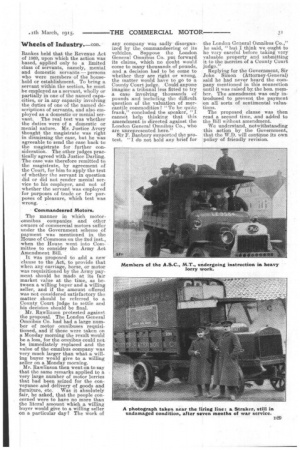Wheels of Industry.—con.
Page 12

If you've noticed an error in this article please click here to report it so we can fix it.
Bankes held that the Revenue Act of 1869, upon which the action was based, applied only to a limited class of servants, namely, menial and domestic servants — persons who were members of the household or establishment. To bring a servant within the section, he must be employed as a servant, wholly or partially in one of the named capacities, or in any capacity involving the duties of one of the named descriptions of servants, and also employed as a domestic or menial servant. The real test was whether the duties were of a domestic or menial nature. Mr. Justice Avory thought the magistrate was right in dismissing the ease, but he was agreeable to send the case back to the magistrate for further consideration. The other judges practically agreed with Justice Darling. The case was therefore remitted to the magistrate, by agreement of the Court, for him to apply the test of whether the servant in question did or did not render menial service to his employer, and not of whether the servant was employed for purposes of trade or for purposes of pleasure, which test was wrong. .
Commandeered Motors.
The manner in which motoromnibus companies and other owners of commercial motors suffer under the Government scheme of payment was mentioned in the House of Commons on the 2nd inst., when the House went into Committee to consider the Army Act Amendment Bill.
It was proposed to add a new clause to the Act, to provide that when any carriage, horse, or motor was requisitioned by the Army payment should be made at its fair market value at the time, as between a willing buyer and a willing seller, and if the amount offered was not considered satisfactory the matter should be Deferred to a County Court judge to settle and his decision should be final.
Mr. Rawlin,,on protested against the proposal. The London General Omnibus Co. had had a large number of motor omnibuses requisitioned, and if these were taken on a Monday morning the result would be a loss, for the omnibus could not be immediately replaced and the value of the omnibus company was very much larger than what a. willing buyer would give to a willing seller on a Monday morning. Mr. Rawiinson then went on to say that the same remarks applied to a very large number of motor lorries that had been seized for the conveyance and delivery of goods and furniture, etc. Was it absolutely fair, he asked, that the people con. cerned were to have no more than the liberal amount which a willing buyer would give to a willing seller on a particular day ? The work of any company was sadly disorganized by the commandeering ot its vehicles. Suppose the London General Omnibus Co. put forward its claims, which no doubt would come to many thousands of pounds, and a decision had to be come to whether they are right or wrong, the matter would have to go to a County Court judge. . Could anyone imagine a tribunal less fitted to try a case involving thousands of pounds and including the difficult question of the valuation of mercantile commodities ? " To be quite frank," concluded the speaker, "I cannot help thinking that this amendment isdirected against the London General Omnibus Co., who are unrepresented here." Sir F. Banbury supported the protest. "I do not. hold any brief for the London General Omnibus Co.," he said, " but I think we ought to be very careful before taking very valuable property and submitting it to the mercies of a County Court judge." Replying for the Government, Sir John Simon (Attorney-General) said he had never heard the company mentioned in this connection until it was raised by. the hon. member. The amendment was only introduced to prevent the payment on all sorts of sentimental valuations.
The proposed clause was then read a. second time, and added to the Bill without amendment.
We understand, notwithstanding this action by the Government, that the W.D. will continua its own policy of friendly revision.





















